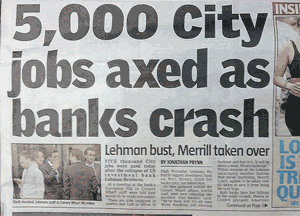Over 30 years of anarchist writing from Ireland listed under hundreds of topics
Paul Bowman
Middle Men and Market Forces - An interview with Conor McCabe
An End to Growth? Beyond the productivist bias of the historical left
 Capitalism is making you fat. Capitalism is also destroying the environment. These two things are more closely connected than you might think. Not all growth is good. Certainly the growth of people’s waistlines and indexes of body fat have lead scientists and health professionals to warn of a global obesity epidemic. 65% of the world’s population now live in countries where being overweight kills more people than being underweight. Worldwide obesity has nearly doubled since 1980 and 1.4 billion adults over 20 are now overweight.
Capitalism is making you fat. Capitalism is also destroying the environment. These two things are more closely connected than you might think. Not all growth is good. Certainly the growth of people’s waistlines and indexes of body fat have lead scientists and health professionals to warn of a global obesity epidemic. 65% of the world’s population now live in countries where being overweight kills more people than being underweight. Worldwide obesity has nearly doubled since 1980 and 1.4 billion adults over 20 are now overweight.
Beyond the "solidarity of the same” - Solidarity, class and empowerment
Solidarity is a word that fills the songs, slogans and even names of movements in the anarchist, socialist and left tradition. Yet the meaning of the term is often assumed to be common knowledge that needs no further explanation or enquiry. In line with the theme of this issue of the Irish Anarchist Review this article aims to look a little deeper into the history and meaning of this term and how it should inform our activity today and the problems we face. Particularly in situations when equal empowerment between all the participants in the solidarity relation cannot be assumed as a starting point. Clearly solidarity, class and equality are all in some way intertwined, but the question is how, exactly?

Capital’s Shadow - the left's analysis of debt
 Over all the forms of oppression and exploitation we face today, debt is cast like a shadow. In “Capital’s Shadow”, Paul Bowman analyses left wing theorisations of debt and concludes that there is a lack in their understanding of “the real nature of money” and poses the need for a “new research project that analyses not only value, but value at risk over time, and through that the role of credit, risk and the world market in the current global regime of accumulation.”
Over all the forms of oppression and exploitation we face today, debt is cast like a shadow. In “Capital’s Shadow”, Paul Bowman analyses left wing theorisations of debt and concludes that there is a lack in their understanding of “the real nature of money” and poses the need for a “new research project that analyses not only value, but value at risk over time, and through that the role of credit, risk and the world market in the current global regime of accumulation.”
Rethinking Class: From Recomposition to Counterpower
 In Paul Bowman’s article ‘Rethinking Class: From Recomposition to Counter-Power’, he poses the question “Is class still a useful idea?” or “should we instead just dispense with it and go with the raw econometrics of inequality?” He draws a line between revolutionary class analysis and universalist utopianism and goes on to explore the history of different ideas of class and the elusive revolutionary subject. After exploring the intersecting lines of class and identity, he poses the challenge that we as libertarians face as we strive to create “cultural and organisational forms of class power [that] do not unconsciously recreate the... hierarchies of identity and exclusion” that are the hallmark of the present society.
In Paul Bowman’s article ‘Rethinking Class: From Recomposition to Counter-Power’, he poses the question “Is class still a useful idea?” or “should we instead just dispense with it and go with the raw econometrics of inequality?” He draws a line between revolutionary class analysis and universalist utopianism and goes on to explore the history of different ideas of class and the elusive revolutionary subject. After exploring the intersecting lines of class and identity, he poses the challenge that we as libertarians face as we strive to create “cultural and organisational forms of class power [that] do not unconsciously recreate the... hierarchies of identity and exclusion” that are the hallmark of the present society.
An anti-capitalist and environmentalist perspective on the Euro crisis

Paul Bowman gives a 40 minute presentation on the Euro as a moment of the internationalisation of capital and looks for a way of dealing with the crisis that goes beyond the alternative models of capital being argued for by the left. If the height of a crisis is not the moment to raise a discussion of an anti-capitalist alternative then when is? Beyond this he also warns against the stagest approach much of the left has adopted where the economic crisis is to be addressed first by a demand for growth and the environmental crisis ignored till later.
An introduction to the crisis in Ireland - causes and potential conflicts
Something entirely unexpected has happened in Ireland - history has gone into reverse. While North Africa, Egypt and the Middle East are struggling to shake of the shackles of neo-colonial dictatorships, Ireland after the Celtic tiger finds itself back in a situation of direct rule. This time not from London, but from the head quarters of the European Central Bank in Frankfurt and the European Commission in Brussels. A state which it now shares with it’s fellow PIGs, Portugal and Greece. For most of the last 60 years we have been told that liberal history went in one direction, from dictatorship and colonial rule to liberal democracy. This picture no longer fits the new status of the PIGs within the European project.
Financial Weapons of Mass Destruction
 Written months before the banking crash of the Autumn of 2008 this is the first part of a series of articles investigating the capitalist financial markets from a critical perspective. It explains in some detail what the various financial instruments are that were to be blamed for the crash and what implication they have for class struggle. (Image: Just around the corner)
Written months before the banking crash of the Autumn of 2008 this is the first part of a series of articles investigating the capitalist financial markets from a critical perspective. It explains in some detail what the various financial instruments are that were to be blamed for the crash and what implication they have for class struggle. (Image: Just around the corner)
The cause of the crisis in global capitalism
A very detailed talk on the cause of the current world financial crisis that starts off by explaining the background economics in an easy to understand manner, moves on to the role the war and other events apart from the sub-prime crash played and concludes with a look at what opportunities have been created for anarchist by this sequence of events.
Communism: What's In A Word?
This article opens by looking at how the meaning of communism as opposed to socialism evolved in the late nineteenth century and closes with a look at how this applies to the free software movement today. The terms socialism and communism appear in England around the 1820s as terms adopted by members of the cooperative movement who were sick of hearing their politics referred to as "Owenism". Originally the two terms were undifferentiated but by the 1840s communism was used by revolutionaries to differentiate themselves from reformists such as J.S.Mill who had adopted socialism to cover an indigestible mess of reformisms.

